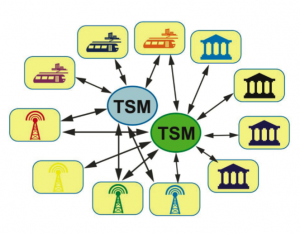GlobalPlatform Releases TSM Messaging Specifications

Standards organization GlobalPlatform today said it has released the first version of specifications designed to enable trusted service managers to speak a common language when they talk to one another to download and manage applications on NFC phones.
The standards, which are behind schedule, are designed to avoid communication problems among the expected fragmented base of trusted service managers, or TSMs, and others in the NFC ecosystem, as NFC services roll out.
The standards would try to ensure, for example, that all banks wanting to offer NFC mobile payment to their customers in a given market could deliver their applications to the SIM cards of subscribers of any mobile operator that makes the service available. Or the standards might come in handy when a subscriber loses his NFC phone and a telco needs to notify all banks, transit operators and other service providers that their NFC services must be canceled.
The messaging standard has been a challenge to draft, GlobalPlatform earlier told NFC Times. Not only will there be a number of companies offering TSM services–including independent and in-house TSMs–but they could represent or be part of a variety of service providers, such as banks, transport operators and retailers. And mobile operators could have their own TSMs that the bank, transport operator or retailer TSMs will have to talk to.
Moreover, there could be multiple secure elements in NFC phones, including SIM cards and embedded chips, that could play host to the payment and other applications. These chips might belong to different parties.
GlobalPlatform, which mainly makes standards for smart cards, had planned to have the TSM messaging standard released more than a year ago. To move things along, the group last spring formed a special committee to work on the project.
“You have so many banks and so many mobile network operators (MNOs),” Eric Le Saint, chairman of GlobalPlatform’s Systems Committee, said at the time. “In order for each bank to address all MNOs and for each MNO to address all banks, you need something like a hub with a common language.”
The new standards use secure Internet technologies for the communication among TSMs and others in the NFC ecosystem, such as mobile operators and banks.
The standards would likely be needed in countries with multiple TSMs or when TSMs need to communicate across borders. In France, where many TSMs plan to do business, mobile operators and other NFC players have already drafted their own interoperability specifications, through the Association Française du sans Contact Mobile, or AFSCM. GlobalPlatform’s new specifications are based in part on the AFSCM specifications. The new GlobalPlatform specs also comply with requirements agreed to by the GSM Association and bank-run European Payments Council.
Other countries, such as Singapore and the Netherlands, are expected to have a single TSM handle most of the downloads and management of applications on secure elements in NFC phones. They would have less need for the new standards—at least for domestic NFC services.
Of course, problems could arise in countries with multiple TSMs, if these technology providers, SIM vendors or embedded chip suppliers don’t comply with the standards.
“Defining a common language is vital to ensuring interoperable communication exchanges between the actors of the mobile NFC ecosystem,” Le Saint, who is also senior director of security, IP and research at ActivIdentity, said in a statement released today.












